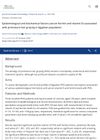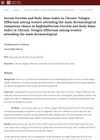 1 citations,
October 2020 in “Journal of Cosmetic Dermatology”
1 citations,
October 2020 in “Journal of Cosmetic Dermatology” Low iron levels are linked to premature graying of hair, but vitamin D levels are not.
February 2025 in “Folia Medica” Low vitamin D levels may be linked to early hair loss in males.
 December 2024 in “Asian Journal of Medical Sciences”
December 2024 in “Asian Journal of Medical Sciences” Low iron levels may be linked to hair loss in women with chronic telogen effluvium.
 December 2024 in “Asian Journal of Medical Sciences”
December 2024 in “Asian Journal of Medical Sciences” Low iron levels may be linked to hair loss in women.
 May 2024 in “World Journal Of Advanced Research and Reviews”
May 2024 in “World Journal Of Advanced Research and Reviews” Low iron levels are strongly linked to chronic hair loss in women.
 May 2024 in “International journal of research in dermatology”
May 2024 in “International journal of research in dermatology” Low vitamin D levels are linked to increased risk of male pattern baldness.
September 2023 in “Diagnostics” Low vitamin D levels may affect ovulation and progesterone in infertile women.
 December 2022 in “Cureus”
December 2022 in “Cureus” Low iron levels are linked to hair loss in women.
 July 2022 in “Dermatology Reports”
July 2022 in “Dermatology Reports” Low zinc levels might be linked to worse outcomes in various skin disorders.
 October 2021 in “QJM: An International Journal of Medicine”
October 2021 in “QJM: An International Journal of Medicine” Low iron levels are linked to premature graying of hair, but vitamin D levels are not.
May 2021 in “Indian journal of forensic medicine and toxicology” Low levels of iron and vitamin D might be linked to chronic hair loss in women.
 July 2020 in “مجله كليه طب الكندي”
July 2020 in “مجله كليه طب الكندي” Low iron levels and obesity are linked to chronic hair loss in women.
 January 2020 in “Journal of Clinical Biochemistry and Nutrition”
January 2020 in “Journal of Clinical Biochemistry and Nutrition” Low zinc levels in chronic liver disease patients are linked to more severe symptoms like taste issues and skin problems, and zinc supplements might help.
January 2019 in “Türkiye klinikleri dermatoloji dergisi” Low levels of iron, ferritin, zinc, and folic acid may contribute to hair loss in women.
 6 citations,
January 2020 in “Postepy Dermatologii I Alergologii”
6 citations,
January 2020 in “Postepy Dermatologii I Alergologii” Check and treat low iron and vitamin D levels in people with hair loss.
 2 citations,
March 2018 in “Clinical Nutrition ESPEN”
2 citations,
March 2018 in “Clinical Nutrition ESPEN” Low vitamin D levels are linked to symptoms like muscle cramps, fatigue, and hair loss.
19 citations,
April 2018 in “Clinical cardiology” Older men with low levels of a testosterone byproduct had a higher chance of developing an irregular heartbeat.
 6 citations,
May 2016 in “Urolithiasis”
6 citations,
May 2016 in “Urolithiasis” Balding and low testosterone increase risk of urinary stones.
December 2021 in “Pakistan Journal of Medical and Health Sciences” Female patients with androgenetic alopecia have low serum ferritin levels.
 January 2022 in “International Journal of Medicine in Developing Countries”
January 2022 in “International Journal of Medicine in Developing Countries” Many patients with hair loss had low iron and vitamin D levels, but thyroid issues were not common.
 3 citations,
January 2017 in “Journal of Pakistan Association of Dermatology”
3 citations,
January 2017 in “Journal of Pakistan Association of Dermatology” Women with certain types of hair loss may have low iron levels, and iron supplements could help.
 July 2018 in “Journal of College of Medical Sciences-nepal”
July 2018 in “Journal of College of Medical Sciences-nepal” Women with certain types of hair loss may have low iron levels.
 10 citations,
February 2008 in “International Journal of Andrology”
10 citations,
February 2008 in “International Journal of Andrology” A combination of nanomilled oral testosterone and dutasteride normalized testosterone levels in men with low testosterone and is safe for short-term use.
 28 citations,
October 2007 in “PubMed”
28 citations,
October 2007 in “PubMed” Low iron levels are linked to more hair loss in non-menopausal women.
 3 citations,
February 2013 in “Bangladesh Journal of Medicine”
3 citations,
February 2013 in “Bangladesh Journal of Medicine” Low iron levels are linked to hair loss in women.
 17 citations,
March 2016 in “Liver international”
17 citations,
March 2016 in “Liver international” Men with advanced liver disease and high oestrone and low testosterone levels have worse health outcomes.
 March 2024 in “Indian Journal of Dermatology”
March 2024 in “Indian Journal of Dermatology” Iron supplements may improve hair loss satisfaction even if initial iron levels are normal.
 11 citations,
January 2014 in “Egyptian Journal of Dermatology and Venereology”
11 citations,
January 2014 in “Egyptian Journal of Dermatology and Venereology” Women losing hair might have lower levels of vitamin D.
 March 2024 in “Portuguese Journal of Dermatology and Venereology”
March 2024 in “Portuguese Journal of Dermatology and Venereology” People with hair loss often have lower levels of iron, vitamin D, and vitamin B12.
Raising serum ferritin levels can improve symptoms like fatigue and hair loss, even if hemoglobin levels are normal.























